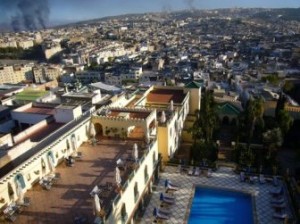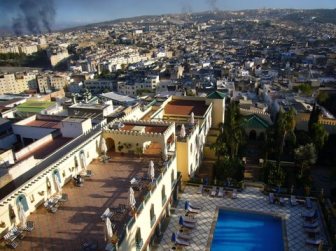 Since 2011, the winds of social and political rumbles breath again. The Arab Spring has changed the face of several regions of the world. A little spark in Tunisia turn into an outbreak worn by millions of people in various countries. Revolutions took place, dictators overthrown, challenges won, but a year later, it is still not clear that the objectives are achieved. Things have certainly changed, but democracy remains a chimera. Between Tunisia, Egypt, Libya, Syria, … people are in turmoil and uncertainty.
Since 2011, the winds of social and political rumbles breath again. The Arab Spring has changed the face of several regions of the world. A little spark in Tunisia turn into an outbreak worn by millions of people in various countries. Revolutions took place, dictators overthrown, challenges won, but a year later, it is still not clear that the objectives are achieved. Things have certainly changed, but democracy remains a chimera. Between Tunisia, Egypt, Libya, Syria, … people are in turmoil and uncertainty.
Post Arab Spring, many articles came close to explaining the Moroccan exception in the Arab and Muslim worlds for English-speaking readers. Michael Totten in his Op-Ed “Is Morocco the Model for Arab Democracy?” struggles with the question of monarchy because, like any good American, the idea just seems antithetical to liberty. The case, to me, is not that clear cut, however. The American republic’s founders rebelled against tyranny, not necessarily against a particular system of government. But because of King George’s multiple abuses against the colonists, the monarchy grew to be associated with tyranny and a federal system, based on divided sovereignties, was born for the first time in modern history.
In the late 19th century, when Theodor Herzl was dreaming of a new state for the Jewish people, he expressed preference for a “democratic monarchy” or “an aristocratic republic” because, for him, unchecked democracy “produces that objectionable class of men—professional politicians.” A case can be made for different forms of government, if such governments offer the maximum amount possible of individual and collective freedoms. The situation is even more complicated in the Arab and Muslim worlds, where ignorance and religious superstition are almost fatally entrenched. The Arab Spring, which now has decidedly turned into unmitigated thuggery and chaos, was doomed to failure from the start because it was inspired by no revolutionary vision. The slogan of “Islam is the answer” was all the best organized political groups and armed rebels could come up with. Answer to what? Underdevelopment?
In the Egyptian Sinai, Islamists are kidnapping and severing the heads of Christians, while more than 1000 people were killed and more than 2000 wounded in Iraq during the past month of July, according to United Nations estimates.
Muslims of the 21st century have no one like 19th-century Herzl. Even worse, they seem to be centuries away from having a leader like 18th-century American Thomas Jefferson.
Since 2011, the winds of social and political rumbles breath again. The Arab Spring has changed the face of several regions of the world. A little spark in Tunisia turn into an outbreak worn by millions of people in various countries. Revolutions took place, dictators overthrown, challenges won, but a year later, it is still not clear that the objectives are achieved. Things have certainly changed, but democracy remains a chimera. Between Tunisia, Egypt, Libya, Syria, … people are in turmoil and uncertainty.
In Morocco 2012 was a pivotal year in terms of human rights, another year rich in social movements. Advances are significant that we can’t ignore. The new Constitution is in itself an undeniable evolution, but still more needs to be done. A year after the massive vote in favour of the new Constitution in 2011, which, for the first time gives primacy to the universal law on the domestic one. Injustice, insecurity, rentier economy and discrimination are no longer appropriate.
The image of the human rights situation in Morocco is relatively mixed. Significant progress, but concerns remain. The first observation, is the solow pace of the implementation of organic laws, meant to convey the spirit of the Constitution. We are facing a legal literature inapplicable on the ground. Hence the sense of a kind of reluctance towards the promotion of the culture of human rights on the ground.
New cases of mistreatment of prisoners were identified in CNDH (National Council of Human Rights). “The government persists in its equivocation not to implement the recommendations of the IER (Equity and Reconciliation Commission).
Concerning judicial reform, everybody recognizes the fact that a lot needs to be done. The Moroccan civil society is working hard to attract the government attention to this sensitive issue. At the instruction of King Mohammed the Moroccan Ministry of Justice has launched a series of forums on the importance of judicial reform. Scholars, NGO and political leaders are contributing to those national debates in order to elaborate a new judicial system that will reinforce the rule of law in Morocco.
On the social level, we can not say that things have improved. Women in rural areas continue to deliver in unacceptable conditions. Fortunately, Mohammed V foundation took the initiative to develop an ambitious program in those villages to improve the living standards of the Moroccans living there by creating vocational training schools to benefit th youth, boarding schools for rural girls and small clinics.
Finally, the list is far from exhaustive. This means that the road is still long and the battle is not over yet. The fight continues. Morocco has voiced its firm determination to tackle all sensitive issues that in the past were taboo. This is the real will of change and reform that has been initiated over the last 12 years. Morocco pledged to go ahead with key reforms not forgetting economic growth. Morocco has put forward an ambitious road map to attract more world investments. Highways, high speed trains, new ports and airports all are built and some are still under construction in order to boost investments and make Morocco an attractive investment hub.
Undoubtedly, there are still some challenges to overcome but the most important is this existing will to move forward and respond to Moroccans expectations and aspirations. This reality reflects Morocco’s exceptionality in North Africa.
Eurasia Review







